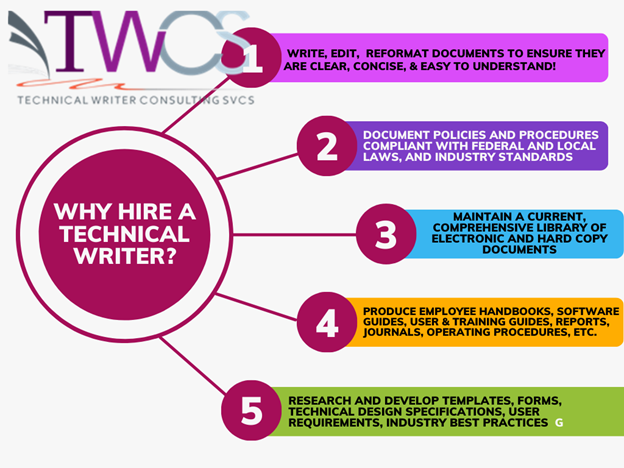I didn’t “choose” technical writing as a career path, I kind of fell into it (but, that’s a story for another day)! Yet, I quickly came to understand the important role it plays in building the foundation of every business!
Companies rely on written policies, processes, and procedures to govern the business and communicate their expectations to staff. Together, these documents form the foundation of your business operations. You must have policies to communicate the company’s operating standards – and processes and procedures to ensure all staff are performing their jobs as expected.
What is Technical Writing?
Technical writing is a specialized form of writing that translates complex information into clear, concise, easy to understand content.
To produce clear, comprehensive documents, the technical writing process involves working with subject matter experts (SMEs), staff, system users, management, and stakeholders to gather information, knowledge, and content. It also involves shadowing staff, interviewing SMEs, holding roundtable discussions, updating old policies, and creating diagrams and flowcharts.
Clarity and accuracy are key objectives in technical writing, so technical terms, concepts, and processes are described using plain language to help ensure the information is accessible to everyone.
Some examples of documents that technical writers produce include company policies, employee handbooks, user guides, standard operating procedures, hiring and on-boarding processes, training guides, procurement processes, proposals, and marketing materials.
That short list of sample documents can help you to see their value in building the foundation of your business!
Why Companies Don’t Have Policies and Procedures
Many companies operate without written policies and procedures. In most cases, in the busyness of building a business, documentation either gets overlooked or created only as needed along the way.
Companies also put this very critical aspect of business on the “back burner”, giving it the lowest priority, both in terms of budget allocation and hiring.
However, in our experience, we have observed the following common triggers that force companies to buckle down and focus on creating company documents.
- Applying for a business loan or grant may require providing the company’s Business Plan, Organization policies, Contingency Plan, or operating procedures.
- Compliance audit – this is especially applicable to government agencies, but all industries can be affected. Here, your organization may need to show proof of documented data privacy policies, cyber security protocols, or system backup procedures.
- Lawsuits filed by a current or former employee accusing another employee or manager of discrimination, harassment, or other inappropriate workplace conduct. In this situation, you may be required to prove that the company has strict policies and disciplinary procedures intended to protect employees from such conduct.
- An employee quits without notice and no other staff member could immediately step in to backfill the position because no one knew exactly what the former employee was doing on a daily basis. If the company had Standard Operating Procedures (SOPs) in place, that SOP could be used to train a new or temporary employee to continue the work without a lapse in service or support.
It is important to know that at a minimum, all established businesses are required by law to put certain policies in place, such as anti-discrimination and health and safety in the workplace. Thus the importance of technical writing. Also, it must be noted that it is not sufficient to “say” you have policies; they must be in writing to be effective and enforceable. Non-compliance could result in legal penalties, expose the company to liability, and affect employee morale.
Who to Hire to Write Your Policies and Procedures
Companies generally hire Technical Writers to write and update documents that fall in the category of “technical documentation”. Technical Writers have the knowledge and skills to create, edit, and update company documents. They can also conduct a gap analysis, which involves reviewing the documents you have, identifying what’s needed, and creating a plan, list of documents, and schedule to close the gaps.
Technical Writers manage the entire documentation process, including developing templates, identifying documents needed, writing content, and incorporating industry regulations, standards, and best practices.

Technical Writer Consulting Services’ (TWCS) network of exceptional technical writer and business analyst professionals are available to help you meet the ever-increasing demands for comprehensive, documented, policies, processes, and procedures.
TWCS collaborates with your team to develop a systematic approach for improving and enhancing your mission-critical systems, processes, and operations. We follow the Business Process Reengineering (BPR) methodology; thus our process involves assessing current state, defining requirements and objectives, eliminating redundancies, minimizing risk, and improving performance and efficiencies. We also make recommendations for future enhancements and reducing overall costs. TWCS’ professionals help you meet the ever-increasing demands for comprehensive, documented, policies, processes, and procedures that are necessary to validate your organization’s compliance with applicable laws, meet audit and cybersecurity requirements, and ensure functional policies.
Join TWCS on our new YouTube channel @writetechs where we will discuss and give more in-depth guidance on developing policies and procedures.
Overall, technical writing helps build a strong foundation for your business by helping you to communicate effectively, ensure consistent and efficient operations, incorporate industry best practices, facilitate training, and comply with applicable laws and regulations.
















